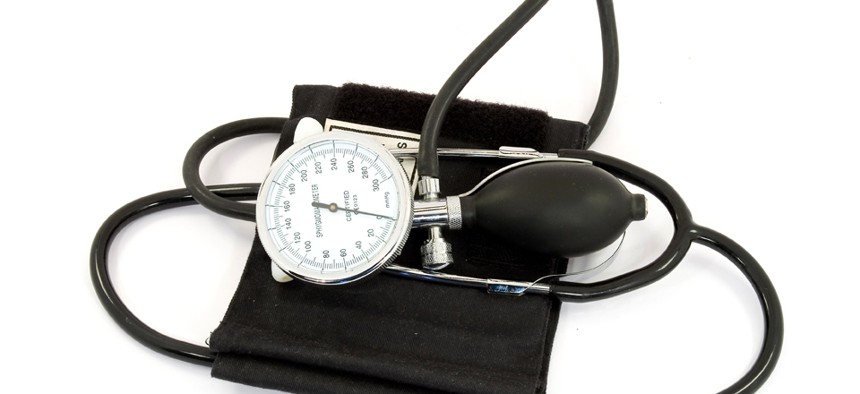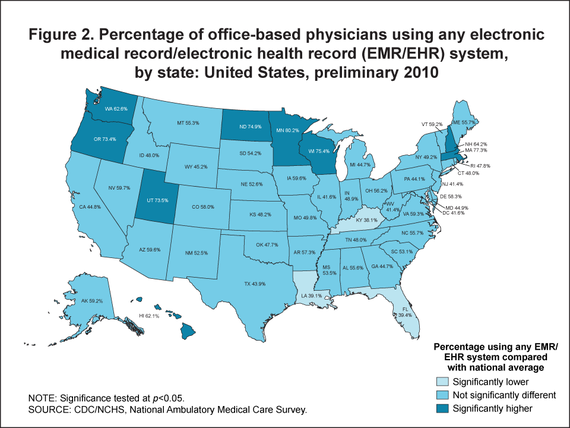The Electronic-Medical-Records Email of the Day, No. 1

PhotoXpress
'Just as cars are not all the same, Electronic Medical Records vary greatly...'
Background: In last month's issue of The Atlantic ( subscribe !) I had a brief Q&A with Dr. David Blumenthal, who had kicked off the Obama Administration's effort to encourage use of electronic medical records. Since then, the mail has kept gushing in, as reported in previous as reported in in our April issue, about why the shift has been so difficult and taken so long. Previous multi-message compendia are available in installments one , two , three , four , five , and six .
As an operational matter, I am going to start doling these out one or sometimes two at a time, on a every-day-or-two basis. They'll have headlines based on this one's, and I will try to figure out some standardized image or illustration as cues that these are part of a series. Generally I'll post these without comment; they're meant to be part of a cumulative conversation among medical professionals, technologists, and the rest of us who are merely patients and bill-payers.
Let's start with two—one from a patient, one from a doctor.
Patient (and tech veteran): I can't stand filling out these damned forms over and over again.
I've been in the high tech industry since I graduate college in 1986, watching it grow from a specialized industry to the giant, interpenetrated octopus it is now. My wife also is in high tech, and indeed started out ... installing EMR systems in hospitals in the early 90s. Just a couple of quick thoughts:
First, if someone—ANYONE—can come up with a system that would prevent me from having to fill out THE SAME information over and over again just because I'm seeing a different doctor, I WILL TAKE IT. You get the same information requirements, but they're all on different forms, in different formats, from different doctors. But all the base information is exactly the same: Name, address, social security number, marital status, kids, insurance info, and so on. It's all the same. I'm seeing a doctor who was recommended by my GP; why in god's name am I filling out yet another form by hand. In 2014. When what most offices do is take my information and ... enter it into their databases by hand. How inefficient can you get? Hell, some doctors require you to put the exact same info *on multiple forms*. There has got to be a better way. [JF note: This is also my experience-as-patient, and I share the exasperation.]
I've long thought what we need is a card that is programmable, the size of a credit or insurance card, that you swipe through a reader, punch in a security code, and it downloads the info to the new doctor's system. Why no one has implemented this I have no idea.
Another note: I'm sure that a lot of the difficulty is incompatible systems, systems that don't play nice with various insurance companies, systems that don't interact with each well, and so on. This is not an inherent flaw of the technology—it would be no different if they were doing everything on paper, and then found, shit, we're using legal-sized, but the insurance requires 8.5 x 11! Or some other mundane problem with paper records. I don't know of any way around the problem other than mandated standards—"Everyone will use Oracle," or some such—and that's not going to happen. But the answer isn't to go backwards, or we'll end up with ink pots and quills.
Finally, I have to believe that the second doctor whom you quote is forced to use three systems partly by insurance-company requirements. I have to believe that if we had single-payer, that would simplify the record-keeping and IT problem considerably.
Doctor: A female doctor—as she notes, her gender is relevant to one of her points—says it's important to distinguish between good and bad systems.
I am a 50+ yo hospitalist (yes, the dreaded hospitalist bogeyman) and have been one for 17+ years. A couple of points, if I may:
1- there's a lot of talk about EMR as an entity without really addressing the quality of the EMR's. Just as cars are not all the same, EMR's vary greatly. A Mercedes, a Maserati and a Yugo are all cars, but you certainly wouldn't accuse someone of rejecting a used Yugo as being a Luddite and hating all cars. Similarly, you shouldn't generalize physicians who reject terrible programs as hating EMR.
They just enacted an EMR/CPOE [CPOE=Computerized Physician Order Entry] at my hospital. The reason this particular program was selected was money, savings by choosing a cheap program and avoiding the federal penalty. It is so difficult to use and (as many other commenters noted) fills your noted with drek and making the useful information difficult to find.The program is so awful, in addition to parts of it being mouse driven, you need to use function keys and arrow keys to navigate. (Just hit F9, Dr. Smith...) When was the last time, in 2014, you were forced to learn a new program that required you to navigate that way? You can't search, you need to know the specific names for tests (CT chest rather than chest CT, dysphagia exam versus video swallow) and you need to click up to 30-40 times to get through something that previously required you to write 1 order. You can accidentally (and dangerously) erase the patient's entire plan of care with 2 clicks (one poor nurse spent 2 hours trying to recreate it) but you need click to confirm and verify multiple things that are clinically insignificant.
I would love an elegant program that enhanced patient care, was safe and made my job easier. Love, love, love it. But instead, I am painted (per lots of your communicants) as a intransigent luddite who doesn't want to move forward. Nothing could be further from the truth.
(By the way, that picture you posted on March 24, with Xrays accessed on the left, trending labs and graphs, looked great! All that info at your fingertips, integrated into the system. What program was that?) [JF note: it appears to have been an "artist's conception" image rather than a real program.]
2-I am an Apple fan. I don't care what the computer has regarding the hardware, I just want it to work, be intuitive and be reliable. (Not unusual for a woman, regarding computers or cars.) However, many of my colleagues are uber-geeks. Just being over 40 doesn't mean we can't handle the technology. We are just less patient of bad technology. I don't use the same phone I used in 1997, don't expect me to use an antiquated, poorly written program which was developed in 1997.
3--Another topic, but: Hospitalists are seeing patients because the primary care physician [PCP] chose that option. There are trade-offs for any system and thehospitalist system is no different. We may not have the longstanding relationships with people and families but we replace that with relationships forged under very emotional and intense circumstances. As with any physician, experiences vary greatly. You wouldn't slam all orthopedic surgeons because you had one bad experience or bad doctor, so you should not generalize one experience onto the whole specialty.
Also, the actual number of times people would actually see their PCP is lower than perceived, usually because of call schedules (seeing your doctor's partners instead) and going to hospitals where your PCP does not have privileges. I addition, your PCP is generally only in the house early morning and after office hours. When families come by in the middle of the day, I am available to talk to them. When someone crashes midday, I can handle it because I am there.
I got hugs from 2 patient families yesterday, one for spending the time to explain why the orthopedic surgeon was recommending an amputation ( he was at another hospital by the time the family got there) , another for transferring a patient after a terrible, prolonged, critical illness to rehab. Neither had PCP's on staff.






